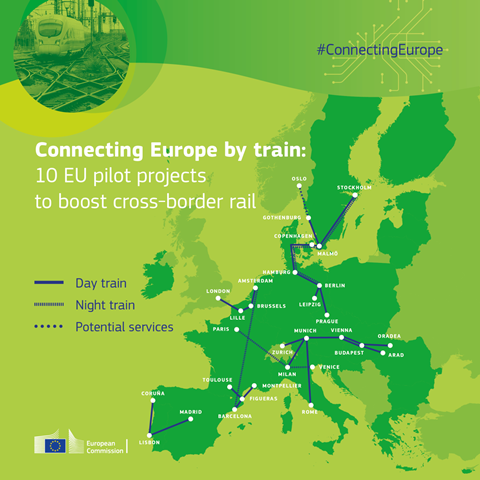
EUROPE: The European Commission has announced that it will support 10 pilot projects for new or improved cross-border passenger services.
Proposals were invited from the rail industry following the publication of the Commission’s action plan to boost long-distance and cross-border passenger rail services in December 2021.
After evaluation, the Commission has selected the following proposals in order of planned start date, with completion envisaged by the end of 2029:
1. Hungary’s Ministry of Transport, reducing Budapest – Wien journey times by eliminating the need to stop near the border, and providing new or enhanced services from Budapest to Arad and Oradea in Romania.
2. Germany – Denmark – Sweden services, with the participation of SJ (Stockholm – København – Berlin night train and a day train linking Hamburg, Göteborg and potentially Oslo in co-operation with DSB and DB); Snälltaget (enhanced night train service between Stockholm, København and Berlin); ČD (new service Praha – Berlin – København, in co-operation with DB and DSB); and Flixtrain (new service Leipzig – Berlin – København – Stockholm).
3. Midnight Trains, new night train service Paris – Milano – Venezia.
4. Flixtrain, new service München– Zürich.
5. Westbahn, new service München – Wien – Budapest as an extension of an existing route.
6. NS, enhancement of the existing Amsterdam – London service, in co-operation with Eurostar.
7. European Sleeper, new night train service Amsterdam – Barcelona.
8. FS and DB, new services from Roma and Milano to München.
9. ILSA, new services linking Lisboa with A Coruña and Madrid.
10. FGC, new cross-border services connecting Barcelona and Catalunya with Figueras, Montpellier and Toulouse in France.
The aim of the pilot schemes is to help operators and authorities break down practical barriers to improving international services.
There is no funding available, but the Commission and the EU Agency for Railways will assist with stakeholder co-ordination, identifying existing or upcoming support tools and clarifying compatibility with EU legislation. The backers can also use the status of ‘pilot service’ for publicity.
Infrastructure works were not eligible, and the Commission will not get involved with rolling stock procurement, which it considers to be a commercial activity.
‘While demand for green mobility is growing, we need the rail market to respond much better and much faster, especially for long and cross-border journeys’, said European Commissioner for Transport Adina Vălean on January 31. ‘This is why the European Commission now wants to help rail companies create new international train connections — by day and by night — by breaking down the many barriers to cross-border rail.’

















